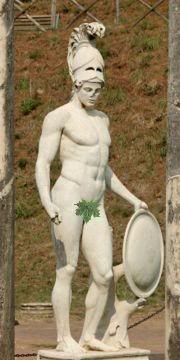Post by bluefedish on Jun 4, 2007 20:29:25 GMT -5
In Greek mythology, Ares is the son of Zeus (ruler of the gods) and Hera. Though often incorrectly referred to as the Olympian god of war, he is more accurately the god of savage war, or bloodlust, or slaughter personified. The Romans identified him as Mars, the Roman god of war (whom they had inherited from the Etruscans) with Hellenic Ares, but among them, Mars stood in much higher esteem.
Among the Hellenes, Ares was always mistrusted. Though Ares' half-sister Athena was also considered to be a war deity, Athena's stance was that of strategic warfare while Ares' tended to be the unpredictable violence of war. His birthplace and true home was placed far off, among the barbarous and warlike Thracians to who he withdrew after he was discovered on a couch with Aphrodite.
"Ares" remained an adjective and epithet in Classical times: Zeus Areios, Athena Areia, even Aphrodite Areia. In Mycenaean times, inscriptions attest to Enyalios, a name that survived into Classical times as an epithet of Ares. Vultures and dogs are sacred to him.
Ares had a quadriga drawn by four gold-bridled fire-breathing immortal stallions. Among the gods, Ares was recognized by his brazen armour; he brandished a spear in battle. His sacred birds were the barn owl, woodpecker, the eagle owl and, especially in the south, the vulture. According to Argonautica the birds of Ares were a flock of feather-dart-dropping birds that guarded the Amazons' shrine of the god on a coastal island in the Black Sea. In Sparta, the chthonic night-time sacrifice of a dog to Enyalios became assimilated to the cult of Ares. Sacrifice might be made to Ares on the eve of battle to enlist his support.

Selected Source:
en.wikipedia.org/wiki/Ares
Among the Hellenes, Ares was always mistrusted. Though Ares' half-sister Athena was also considered to be a war deity, Athena's stance was that of strategic warfare while Ares' tended to be the unpredictable violence of war. His birthplace and true home was placed far off, among the barbarous and warlike Thracians to who he withdrew after he was discovered on a couch with Aphrodite.
"Ares" remained an adjective and epithet in Classical times: Zeus Areios, Athena Areia, even Aphrodite Areia. In Mycenaean times, inscriptions attest to Enyalios, a name that survived into Classical times as an epithet of Ares. Vultures and dogs are sacred to him.
Ares had a quadriga drawn by four gold-bridled fire-breathing immortal stallions. Among the gods, Ares was recognized by his brazen armour; he brandished a spear in battle. His sacred birds were the barn owl, woodpecker, the eagle owl and, especially in the south, the vulture. According to Argonautica the birds of Ares were a flock of feather-dart-dropping birds that guarded the Amazons' shrine of the god on a coastal island in the Black Sea. In Sparta, the chthonic night-time sacrifice of a dog to Enyalios became assimilated to the cult of Ares. Sacrifice might be made to Ares on the eve of battle to enlist his support.

Selected Source:
en.wikipedia.org/wiki/Ares



